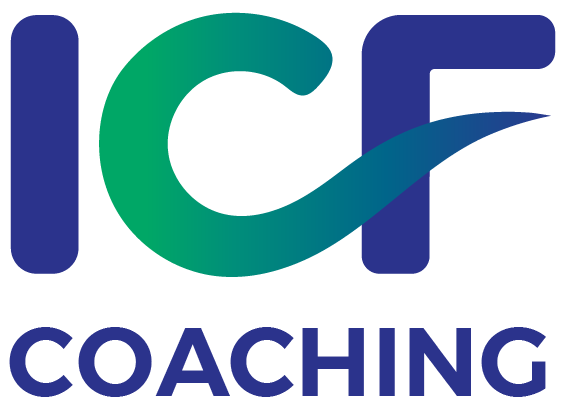Table of Contents
TogglePersonality Development: Consistently Building Character
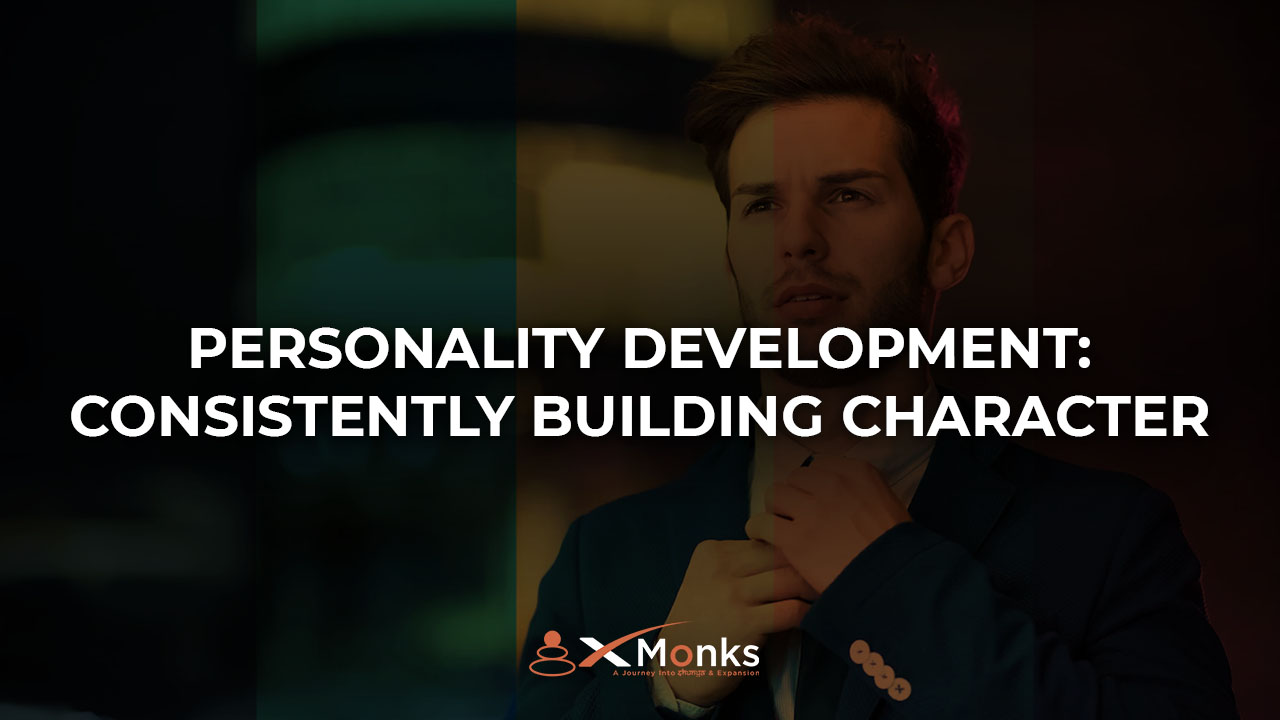
Personality is the canvas upon which we paint our lives. It defines how we think, how we connect, and how we leave our mark on the world. But is personality set in stone? Or can it be molded, refined, and elevated?
Personality development is the conscious effort to shape and refine one’s character, behavior, and mindset. It’s the journey of self-discovery, where we embrace our strengths, acknowledge our flaws, and cultivate qualities that enhance our interactions and experiences. And what better way to begin than by taking a personality and character test—a mirror reflecting who we are and who we can become?
In this blog, we’ll unravel the depths of personality development, exploring its significance, techniques, and the magic it brings to our lives.
Yet, leadership is not merely a set of skills to be learned; it is a journey—one that intertwines personal growth, emotional intelligence, and strategic foresight. Developing a leader requires more than a textbook or a weekend seminar; it requires experience, mentorship, and a deep understanding of human nature.
Imagine an orchestra where each musician plays their own tune without direction. The result? Chaos. Now, introduce a conductor who understands the strengths of each instrument, who guides the rhythm, and who brings harmony to the composition. That is what great leadership does—it transforms potential into power, aligning individual efforts toward a shared purpose.
To illustrate this concept, we’ll explore fresh perspectives on leadership training, real-world examples, and actionable insights on how to nurture leaders for the future.
Understanding Personality Development
What is Personality Development?
Personality development is a lifelong process of self-improvement. It goes beyond just improving one’s social skills; it involves emotional intelligence, self-awareness, confidence, and adaptability.
Why Does Personality Development Matter?
- It enhances self-confidence and self-esteem.
- It improves communication and social skills.
- It helps in better decision-making.
- It fosters emotional intelligence and resilience.
- It unlocks new opportunities in personal and professional life.
Personality vs. Character: Understanding the Core Differences
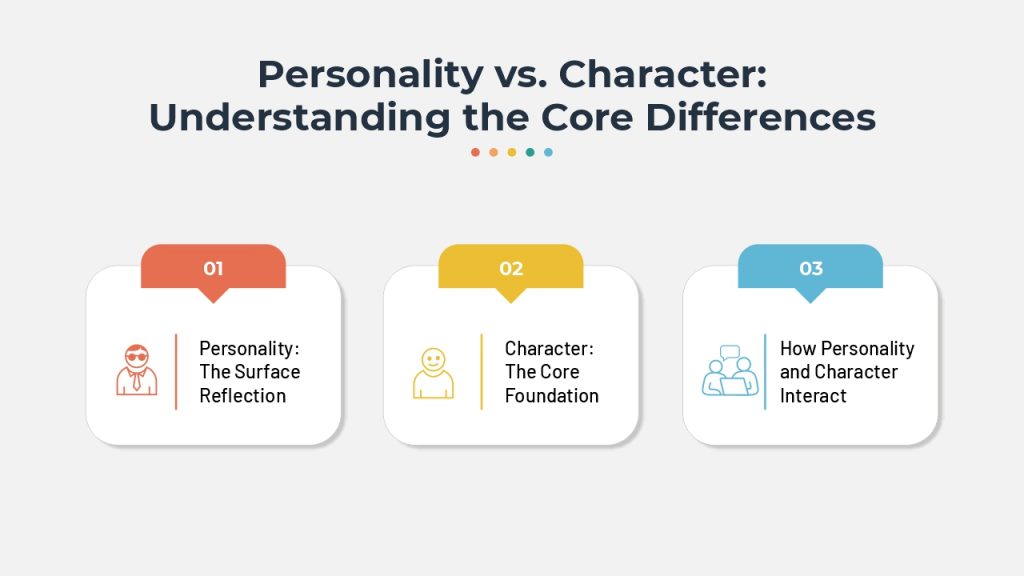
Personality: The Surface Reflection
Personality is the outward expression of an individual—how we present ourselves, our mannerisms, our communication style, and even our confidence. It is shaped by experiences, environment, and sometimes even the situations we find ourselves in.
- It is dynamic and adaptable—we can alter how we behave in different settings.
- It is impression-based—people judge personality almost instantly.
- It includes charisma, social skills, and confidence, all of which contribute to how likable or engaging a person appears.
While personality is crucial in making first impressions, it does not always reflect the true nature of a person. A seemingly warm and friendly personality can sometimes mask selfish intentions, just as a reserved one might conceal deep kindness.
Character: The Core Foundation
If personality is the mask we wear, character is the foundation beneath it. It consists of deeply ingrained moral values, ethics, and principles that guide our decisions and actions, especially when no one is watching.
- It is built over time through experiences and choices.
- It is consistent—unlike personality, character does not change based on the situation.
- It includes honesty, integrity, empathy, and resilience, which determine whether a person is truly good at heart.
Character cannot be faked for long; it always reveals itself in times of crisis. A person with strong moral character will stand by their values, even if it is inconvenient, while someone with only a charming personality may falter when tested.
How Personality and Character Interact
While different, personality and character often work together. A charismatic individual with strong character becomes a leader who inspires trust. However, someone with an attractive personality but weak character may impress initially but will eventually be exposed.
Developing both is key—personality helps us connect, while character ensures those connections are built on honesty and authenticity.
Understanding the difference between personality and character is essential in self-awareness and personal growth. While personality can be polished and shaped, character is a lifelong investment—one that determines not just how others perceive us, but how we truly live our lives.
Would you rather be known for an attractive personality or a solid character? The best answer lies in striking the right balance between both.
How Personality and Character Tests Help in Self-Discovery
In a world that constantly tells us who to be, self-discovery is an act of rebellion. To truly know oneself is to step beyond the expectations of society, past the illusions of perception, and into the depths of our authentic being. But where do we begin? Personality and character tests offer a structured approach to this journey, providing a mirror that reflects both the surface and the soul.
Understanding Personality and Character Tests
At their core, these tests aim to help individuals recognize their strengths, weaknesses, and behavioral tendencies. But they do more than just categorize—they illuminate the hidden corridors of our identity.
- Personality tests assess how we interact with the world—our energy, communication style, decision-making approach, and adaptability.
- Character tests delve deeper into our moral compass, values, and integrity, revealing the ethical backbone that shapes our actions.
While personality is the mask we wear, character is who we are when no one is watching. Both are essential in understanding our truest self.
The Role of These Tests in Self-Discovery
- Bringing Self-Awareness to the Forefront
Most people move through life unconscious of their true motivations. Personality and character tests name the patterns we unknowingly follow, helping us make sense of our behaviors and emotions. - Unraveling Strengths and Weaknesses
Self-discovery is not just about knowing what we are good at—it’s also about acknowledging our weaknesses. These tests highlight both, allowing us to embrace our natural strengths while working on areas that need improvement. - Helping in Career and Personal Growth
Many organizations use these tests to match employees to roles that align with their strengths. For individuals, knowing their personality and character type can guide career choices, relationships, and personal development goals. - Enhancing Emotional Intelligence
Understanding our personality traits helps us recognize our emotional triggers, communication preferences, and how we relate to others. In turn, this fosters stronger relationships—both personal and professional. - Guiding Personal Growth and Transformation
Self-awareness is the first step toward change. By knowing where we stand, we can take intentional steps toward becoming the person we aspire to be.
Popular Personality and Character Tests for Self-Discovery
- Myers-Briggs Type Indicator (MBTI) – Categorizes people into 16 personality types based on preferences in decision-making, energy, and perception.
- Big Five Personality Traits – Measures openness, conscientiousness, extraversion, agreeableness, and neuroticism.
- Enneagram – Explores deep-rooted fears and motivations to uncover one’s core personality type.
- The VIA Character Strengths Test – Identifies fundamental virtues such as kindness, wisdom, and perseverance.
Each of these tests provides valuable insights that can act as a compass on the path of self-discovery.
Taking a personality and character test is more than an exercise in curiosity—it’s a powerful tool for personal growth. These assessments help us understand our essence, refine our strengths, and work on our limitations. The better we know ourselves, the more control we have over our destiny.
After all, the greatest journey we can ever take is the one within.
The Pillars of Personality Development
In the grand architecture of life, personality development is the foundation upon which we build our identity. It is not just about charm or charisma but about cultivating a well-rounded, confident, and resilient self. Like any masterpiece, it stands upon unshakable pillars—core principles that shape who we are and who we become.
What is Personality Development?
Personality development is the continuous process of refining our thoughts, emotions, behavior, and interactions with the world. It involves not just external traits like communication and confidence but also internal values such as integrity and self-awareness.
At its core, it is about becoming the best version of ourselves.
The Five Pillars of Personality Development
1. Self-Awareness: Knowing Thyself
Before we can shape our personality, we must first understand it. Self-awareness is about looking inward and asking:
- What are my strengths and weaknesses?
- What motivates me?
- How do I react to challenges?
Personality and character tests can be great tools for uncovering these answers, offering insight into our natural tendencies and areas for growth.
2. Emotional Intelligence: The Heart of Growth
A well-developed personality isn’t just about how we think—it’s also about how we feel and respond to emotions. Emotional intelligence consists of:
- Self-regulation – Managing impulses and emotions effectively.
- Empathy – Understanding and connecting with others.
- Social skills – Building strong, meaningful relationships.
People with high emotional intelligence navigate life with greater ease, handling stress and relationships with wisdom and grace.
3. Confidence: The Power of Self-Belief
Confidence is the fuel that drives action. Without it, even the most talented individuals hesitate, their potential left unrealized. To build confidence:
- Develop competence in your skills.
- Adopt positive self-talk and affirmations.
- Step outside your comfort zone regularly.
Confidence is not arrogance—it is the quiet certainty that you are capable.
4. Adaptability: Thriving in Change
Life is unpredictable. The ability to adapt and evolve is a crucial pillar of personality development. Those who resist change remain stagnant, while those who embrace it grow and flourish.
Adaptability means:
- Keeping an open mind.
- Learning from failures instead of fearing them.
- Developing resilience to face challenges.
A strong personality is not rigid—it flows like water, adjusting to the landscape without losing its essence.
5. Integrity and Values: The Moral Compass
At the heart of true personality development lies character—our unwavering commitment to principles such as honesty, kindness, and respect. While personality makes us interesting, character makes us trustworthy.
To develop strong values:
- Stay true to your word.
- Make ethical choices, even when no one is watching.
- Surround yourself with people who uplift and challenge your moral growth.
A well-developed personality shines, not just in words, but in actions.
Personality development is a lifelong journey, built upon self-awareness, emotional intelligence, confidence, adaptability, and integrity. These pillars support the creation of a person who is not only successful but also deeply fulfilled.
Because at the end of the day, the goal isn’t just to impress the world—it’s to become someone you truly admire.
Practical Steps to Enhance Personality Development
Personality is not a fixed trait; it is a dynamic force that evolves with time, experience, and conscious effort. Personality development is the art of refining our thoughts, behaviors, and habits to become the best version of ourselves. But how do we enhance it in practical, actionable ways? Let’s explore.
Why Personality Development Matters
A well-developed personality boosts confidence, emotional intelligence, and adaptability—essential traits for personal and professional success. It influences how we connect with others, handle challenges, and navigate the complexities of life.
The journey to self-improvement may seem overwhelming, but small, intentional steps can make a world of difference.
Step-by-Step Guide to Personality Development
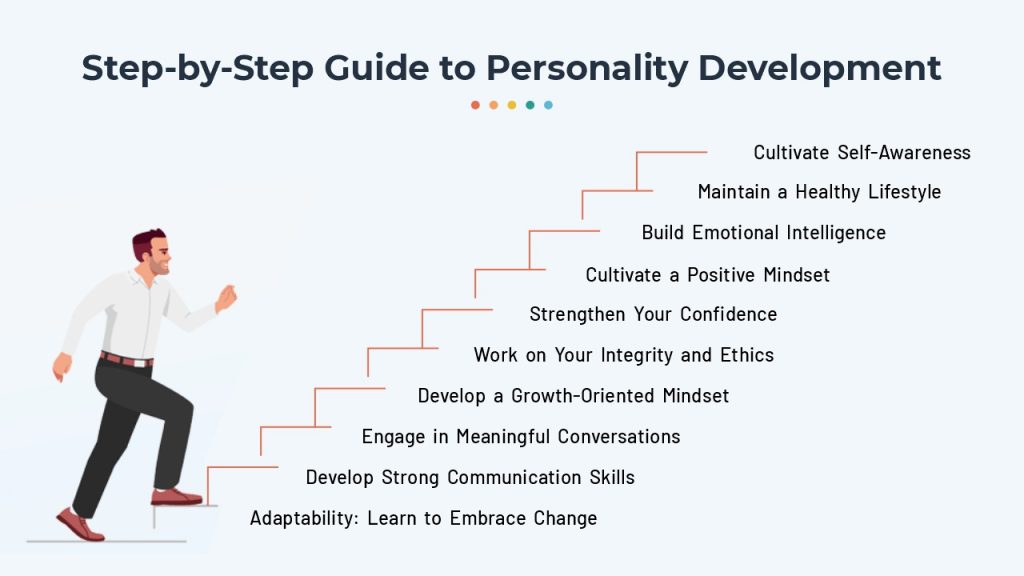
1. Cultivate Self-Awareness
Before changing anything, you must first understand yourself. Ask yourself:
- What are my strengths and weaknesses?
- What kind of energy do I bring into a room?
- How do I handle stress and criticism?
Using a personality and character test can provide insights into your natural tendencies, helping you build on strengths and improve weaknesses.
2. Develop Strong Communication Skills
Your ability to express yourself shapes how others perceive you. Work on:
- Active listening – Give full attention when someone speaks.
- Clarity in speech – Avoid fillers like “um” and “like.”
- Body language – Maintain eye contact and use open gestures.
Practicing public speaking or joining discussion groups can also sharpen communication skills.
3. Build Emotional Intelligence
People with high emotional intelligence navigate life with ease. To develop this:
- Recognize and manage your emotions.
- Show empathy by understanding others’ perspectives.
- Learn to handle conflicts calmly and rationally.
A well-developed personality is one that understands both self and others.
4. Cultivate a Positive Mindset
Optimism is a magnet for success. To build a positive mindset:
- Practice gratitude daily.
- Reframe failures as learning opportunities.
- Surround yourself with uplifting people and environments.
A strong personality radiates positivity, even in adversity.
5. Strengthen Your Confidence
Confidence is not about being perfect—it’s about believing in your ability to grow.
- Dress well and maintain good posture.
- Set small, achievable goals and celebrate progress.
- Step out of your comfort zone regularly.
Confidence grows one action at a time.
6. Develop a Growth-Oriented Mindset
A rigid mindset leads to stagnation. A growth mindset, on the other hand, encourages continuous learning.
- Read books on self-improvement and psychology.
- Learn new skills to keep your mind sharp.
- Seek constructive feedback and use it to grow.
People with a growth mindset view challenges as opportunities rather than setbacks.
7. Adaptability: Learn to Embrace Change
Life is unpredictable, and the ability to adapt is a mark of a strong personality.
- Accept that change is inevitable.
- Develop problem-solving skills.
- Stay calm and composed in uncertain situations.
The most remarkable personalities evolve with time.
8. Work on Your Integrity and Ethics
Personality development is not just about charm—it’s about character.
- Keep your word and honor commitments.
- Treat others with kindness and respect.
- Make ethical choices, even when no one is watching.
A person’s true personality shines through their actions.
9. Maintain a Healthy Lifestyle
Your body and mind are connected. A healthy lifestyle supports overall personality growth.
- Exercise regularly for mental clarity.
- Eat nutritious food to fuel your energy.
- Practice meditation or mindfulness for inner balance.
Good health enhances confidence, mood, and overall presence.
10. Engage in Meaningful Conversations
Engaging discussions broaden your mind and enhance your personality.
- Talk to people from different backgrounds.
- Be curious—ask open-ended questions.
- Share ideas and listen actively.
Great personalities are shaped by great conversations.
Personality development is a lifelong journey of growth, learning, and refinement. By taking intentional steps—building confidence, strengthening emotional intelligence, and embracing adaptability—you shape not only your personality but also your destiny.
The best version of you is waiting. Start today.
The Impact of Personality Development on Career Growth
In today’s competitive world, talent and technical skills alone are not enough to guarantee career success. Personality development plays a crucial role in shaping professional growth, influencing everything from workplace relationships to leadership opportunities. A well-rounded personality can open doors that mere qualifications cannot.
Let’s explore how personality development impacts career growth and why it’s essential for long-term success.
The Link Between Personality Development and Career Success
A strong personality does more than just make a good impression; it defines how effectively you navigate professional challenges. Employers seek individuals who can:
- Communicate clearly and persuasively.
- Adapt to changing circumstances.
- Display confidence and leadership.
- Work well in teams and handle conflicts diplomatically.
When combined with technical expertise, these qualities create a powerful professional presence.
How Personality Development Enhances Career Growth
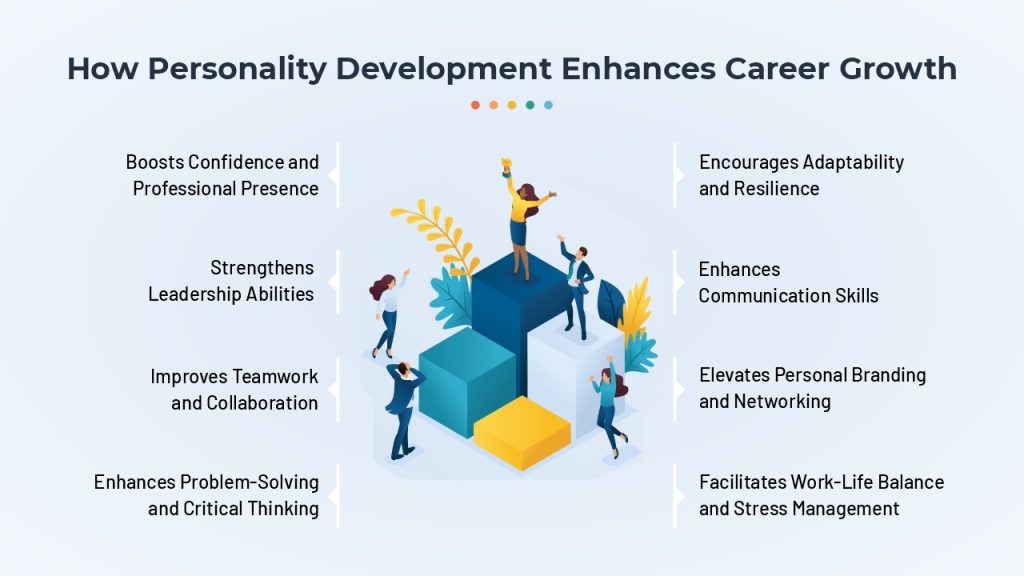
1. Boosts Confidence and Professional Presence
Confidence is the foundation of career success. Whether it’s speaking in meetings, handling client interactions, or leading a team, self-assured individuals command respect.
- A confident personality helps in securing promotions.
- It improves public speaking and presentation skills.
- Confidence allows professionals to take calculated risks, leading to innovation and growth.
A well-developed personality exudes confidence without arrogance, making one a natural leader.
2. Enhances Communication Skills
Success in any career depends on how well you communicate. Personality development strengthens:
- Verbal communication – Speaking clearly, concisely, and persuasively.
- Non-verbal communication – Body language, eye contact, and tone of voice.
- Written communication – Crafting emails, reports, and presentations effectively.
Improved communication fosters better workplace relationships, boosting collaboration and productivity.
3. Strengthens Leadership Abilities
Leaders are not just born; they are made through continuous personality development. Key leadership traits include:
- Decision-making skills – The ability to think critically and act confidently.
- Emotional intelligence – Understanding and managing team dynamics.
- Problem-solving abilities – Approaching challenges with resilience and creativity.
A well-developed personality naturally positions individuals for leadership roles.
4. Encourages Adaptability and Resilience
The corporate world is dynamic, requiring professionals to adapt and evolve. Personality development fosters:
- Flexibility in handling new responsibilities.
- Resilience in overcoming setbacks and failures.
- A positive attitude towards change and uncertainty.
Employees who demonstrate adaptability are more likely to thrive in competitive environments.
5. Improves Teamwork and Collaboration
Personality development teaches individuals to work well with others, a critical skill in any profession.
- Empathy and emotional intelligence enhance workplace relationships.
- Conflict resolution skills prevent misunderstandings and office politics.
- A friendly, approachable personality fosters team spirit and cooperation.
In the modern workplace, teamwork is as valuable as individual expertise.
6. Enhances Problem-Solving and Critical Thinking
A sharp, well-rounded personality is equipped with the ability to think on its feet.
- Strong analytical skills lead to better decision-making.
- A solution-oriented mindset helps in overcoming challenges efficiently.
- Creativity and strategic thinking drive career innovation.
Employers value individuals who can solve problems independently and effectively.
7. Elevates Personal Branding and Networking
Your personality shapes your personal brand—how people perceive you in professional settings.
- A charismatic personality attracts mentors and career opportunities.
- Networking becomes easier when one is articulate and engaging.
- An authentic, well-developed personality leaves a lasting impression on employers and colleagues.
Strong personal branding accelerates career progression and recognition.
8. Facilitates Work-Life Balance and Stress Management
A well-developed personality is not just about professional success but also personal well-being.
- Time management skills prevent burnout.
- Emotional stability helps in managing workplace stress.
- A positive attitude enhances job satisfaction.
A balanced personality leads to sustained career growth without compromising mental health.
In the corporate world, technical skills get you the job, but personality development helps you grow. Confidence, adaptability, communication, leadership, and resilience are all key to unlocking career success.
By investing in continuous personality development, professionals not only stand out in their field but also create a fulfilling, long-term career.
Your career is not just about what you do—it’s about who you become.
FAQs
Conclusion
Personality development is not a destination—it’s a journey of continuous learning and transformation. With self-awareness, discipline, and effort, anyone can cultivate a personality that is confident, adaptable, and inspiring. The key lies in taking that first step—whether it’s a personality and character test or a small daily habit change.
Who do you want to become? Start shaping that person today.
